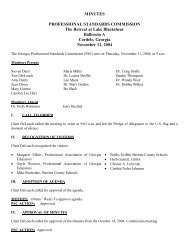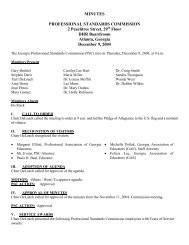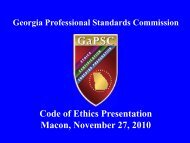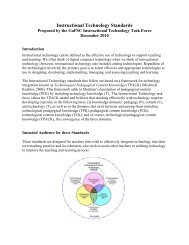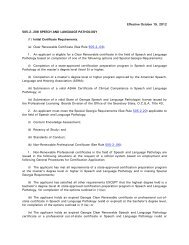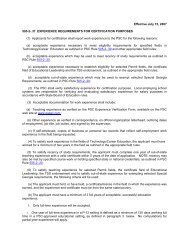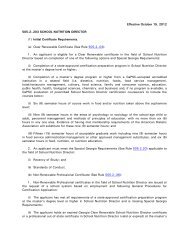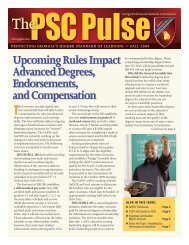PRS - GaPSC
PRS - GaPSC
PRS - GaPSC
Create successful ePaper yourself
Turn your PDF publications into a flip-book with our unique Google optimized e-Paper software.
Regional Educational Service Agency (RESA). An education entity providing services to a group of<br />
member school systems in a particular region of Georgia.<br />
Rejoinder. See BOE Report Rejoinder.<br />
Residency. (Educational Leadership) an internship that provides significant opportunities for candidates<br />
to synthesize and apply the knowledge and practice and develop the skills identified in <strong>GaPSC</strong><br />
Educational Leadership Standards 1-6 through substantial, sustained, and standards-based work in real<br />
settings, planned and guided cooperatively by the institution and school district personnel for graduate<br />
credit.<br />
Rubrics. Written and shared criteria for judging performance that indicate the qualities by which levels of<br />
performance can be differentiated, and that anchor judgments about the degree of success on a candidate<br />
assessment.<br />
Scholarship. Systematic inquiry into the areas related to teaching, learning, and the education of teachers<br />
and other school professionals. Scholarship includes traditional research and publication as well as the<br />
rigorous and systematic study of pedagogy and the application of current research findings in new<br />
settings. Scholarship further presupposes submission to one’s work for professional review and<br />
evaluation.<br />
Scholastic Aptitude Test (SAT®). Test administered by the College Board and designed to measure<br />
verbal and quantitative reasoning skills that are related to academic performance in college. SAT scores<br />
are intended to help forecast the college academic performance of individual students.<br />
School Faculty. Licensed practitioners in P-12 schools who provide instruction, supervision, and<br />
direction for candidates during field-based assignments.<br />
School Partners. P-12 schools that collaborate with the higher education institution in designing,<br />
developing, and implementing field experiences, clinical practice, delivery of instruction, and research.<br />
Service. Faculty contributions to college or university activities, P-12 schools, communities, and<br />
professional associations in ways which are consistent with the institution and the professional education<br />
unit’s mission.<br />
Service Learning. A teaching/learning method that integrates community service into academic courses,<br />
using structured reflective thinking to enhance learning of course content. Through meaningful service,<br />
candidates are engaged in problem solving to create improved schools and communities while developing<br />
their academic skills, their sense of civic responsibility, and their understanding of social problems<br />
affecting children and families. When used as a pedagogical strategy, service learning can help<br />
candidates understand the culture, community, and families of students, as well as the connections<br />
between the school and the community.<br />
Skills. The ability to use content, professional, and pedagogical knowledge effectively and readily in<br />
diverse teaching settings in a manner that ensures that all students are learning.<br />
Southern Association for Colleges and Schools (SACS). The association which accredits K-12 schools,<br />
colleges and universities in the southern states.<br />
53



